A woman believed to be the first in Brazil to ask the state for permission to end a pregnancy that did not result from a rape or involve medical issues has had an abortion — in Colombia.
With one request denied by the Supreme Court and fearing that another would languish in the justice system, Rebeca Mendes told The Associated Press on Monday that she decided to have the procedure done abroad so as not to be punished in Brazil.
The decision ends her involvement in a case that garnered national headlines in Latin America's most populous nation and sought to push the limits on restrictive abortion laws.

Rebeca Mendes poses for a photo during an interview in Sao Paulo, Brazil, Monday, Dec. 11, 2017. Mendes filed a case with the Supreme Court in late November seeking to have an abortion when she was six weeks pregnant, but the court rejected her request so while waiting for a decision on another petition she traveled to Colombia and had an abortion there. (AP Photo/Andre Penner)
In an interview, Mendes, 30, said her decision was not just an economic one. The single mother of two boys, ages 6 and 9, said a third child would have substantially affected her family, both financially and emotionally.
"I didn't terminate this pregnancy for a kilogram of rice or a kilogram of beans," she said, noting that some who disagreed with her decision had offered financial support upon hearing her story. "I would have had to give up many dreams. I'm going to university to have a career to be able to give a better life to my two kids."
Abortion in Brazil, home to the largest population of Roman Catholics and fast-growing evangelical faiths, is legal in three cases: when a woman's life is in danger, if a woman has been raped, or when a fetus has anencephaly, a malformation of the brain.
Mendes filed her petition with the Supreme Court in late November, when she was six weeks pregnant.
Activists hoped that telling one woman's story would humanize their quest to legalize abortion. But two days after her petition was filed, the court rejected her urgent request. The court will eventually consider the larger argument, but it is unclear when that might happen.
Mendes said she was in the process of switching her birth control when she became pregnant. She said the thought of another child at this moment in her life was overwhelming. She earns about $380 a month working at the national statistics agency on a temporary contract, while also going to law school. She gets another $200 to $300 monthly from the boys' father — just enough to cover her rent of $180 and a few other expenses.
Having the abortion done in Colombia was happenstance. The Latin American Consortium against Unsafe Abortion invited her to an event last week to share her story, and while she was in Bogota a private clinic offered to perform a pro-bono abortion, which is legal in Colombia to preserve a woman's mental health.
What makes Mendes unusual is not that she was seeking an abortion, but rather that she was unwilling to go outside the law to do it, as thousands of Brazilian women do each year.
Mendes said she had read horror stories about women bleeding out at home after taking the drug misoprostol, known as cytotec in Brazil. Experts say the drug, which is highly regulated in Brazil, is generally a safe way to induce abortions in early pregnancy, although it can lead to complications.
Women's health experts estimate between 400,000 and 800,000 women have an abortion each year in Brazil — nearly all of them illegally. Besides cytotec, the ways pregnancies are terminated range from high-end clinics that quietly perform abortions for women who can afford them to more primitive means.
"I didn't want to die," Mendes said. "I would be suffering my worst fears: either to die at home and not be able to raise my children or be arrested and also not able to raise my children. There was no way out."
VILLA MADERO, Mexico (AP) — As a drought in Mexico drags on, angry subsistence farmers have begun taking direct action on thirsty avocado orchards and berry fields of commercial farms that are drying up streams in the mountains west of Mexico City.
Rivers and even whole lakes are disappearing in the once green and lush state of Michoacan, as the drought combines with a surge in the use of water for the country’s lucrative export crops, led by avocados.
In recent days, subsistence farmers and activists from the Michoacan town of Villa Madero organized teams to go into the mountains and rip out illegal water pumps and breach unlicensed irrigation holding ponds.
A potential conflict looms with avocado growers — who are often sponsored by, or pay protection money to, drug cartels.
Last week, dozens of residents, farmworkers and small-scale farmers from Villa Madero hiked up into the hills to tear out irrigation equipment using mountain springs to water avocado orchards carved out of the pine-covered hills.
The week before, another group went up with picks and shovels and breached the walls of an illegal containment pond that sucked up water from a spring that had supplied local residents for hundreds of years.
“In the last 10 years, the streams, the springs, the rivers have been drying up and the water has been captured, mainly to be used for avocados and berries,” said local activist Julio Santoyo, one of the organizers of the effort. “There are hamlets in the lower part of the township that no longer have water.”
Santoyo estimated that about 850 of the plastic-lined, earthen containment ponds have sprung up in the hills around Villa Madero, usually soon after planters have illegally logged or burned the native pine forest. Pines help the soil retain water, while avocado trees deplete it.
Francisco Gómez Cortés said residents of his hamlet, El Sauz, had been asking the landowner for 15 years to allow the spring to flow downhill to their community.
After a year in which Mexico received only about half its normal rainfall, residents became desperate, and last week they worked up the courage to hike up the hill and rip out pumps and hoses for the avocado orchard.
“We don't have enough water for human consumption,” Gómez Cortés said.
“It’s sad. It’s sad to walk down these trails that are now dry, when they once had trees and springs,” he said. “They haven’t even left any water for the (forest) animals that nest along the banks.”
In a sign of how seriously the local government is taking the potential threat, the group was accompanied by the mayor of Villa Madero, who blamed outsiders for the problem.
“There are people who aren't from this town, who come to our township and are invading us,” Mayor Froylan Alcauter Ibarra said. “They are taking water away from the people who live downhill, and they don't realize these are the poorest people.”
Residents say they don't want to deny water entirely to the orchards and have proposed an agreement to give landowners 20% of the water from local streams, if they allow the remaining 80% to keep flowing. They say they haven't gotten any response yet.
Drug cartels often make money from illegal logging and extorting money from avocado growers in Michoacan. The activists around Villa Madero have suffered threats, kidnappings and beatings in the past.
“We are running a serious risk of them killing us for protesting,” Gómez Cortés said. “Out of necessity, we are doing what the government should be doing.”
The government has long done little to limit the growers and combat deforestation and water takeovers. But it does seem to have developed a sudden interest in preventing the looming conflict.
In March, activists organized a meeting nearby at Patzcuaro Lake to demand authorities do something about the fast-declining water levels. Patzcuaro is a shallow but extensive lake in Michoacan with a beautiful colonial town on its shores and an island of fishermen perched in the middle.
The fishermen of Janitzio island with their shallow boats and hooped, figure-eight nets were made famous by photographers and filmmakers in the 1940s and 50s as a symbol of Mexico's folk traditions. The town of Patzcuaro draws hundreds of thousands of tourists.
But due to the drought, deforestation, sediment buildup and the increased water demands from avocado and berry growers, Patzcuaro lake has been reduced to about half its size. You can now reach the Janitzio island by wading, and activist Juan Manuel Valenzuela estimates that 90% of the boats that used to fish and ferry tourists around are now out of service.
Nearby Lake Cuitzeo, one of the largest freshwater lakes in Mexico, is now nearly dried up.
“We cannot allow them to extinguish our lakes,” Valenzuela said. “It would be a tragedy for Michoacan.”
Alejandro Méndez, Michoacan's state environment secretary, acknowledges that the problem has gotten out of hand. So scarce has water become in the once-lushly forested lake areas that orchard owners often send tanker trucks to suck thousands of gallons from the lake to water their groves.
“As many as 100 trucks could be seen taking water from the lake,” Méndez said of the situation in March.
So about a week ago, the state police began patrolling the lake shore and detaining any truck drivers they saw extracting water. And Méndez said the state has begun monitoring agricultural holding ponds to see if any are getting refilled from the lake.
While Lake Patzcuaro has grown and shrunk in the past, this time it may be terminal; farmers are starting to pasture livestock and plant crops on the lake bed.
“It will be difficult, because the humans and the livestock will survive, barely, but the animals and the plants will be gone — that will all be dried up and gone,” Gómez Cortés said.
AP writer Mark Stevenson in Mexico City contributed to this report.
Follow AP’s coverage of Latin America and the Caribbean at https://apnews.com/hub/latin-america
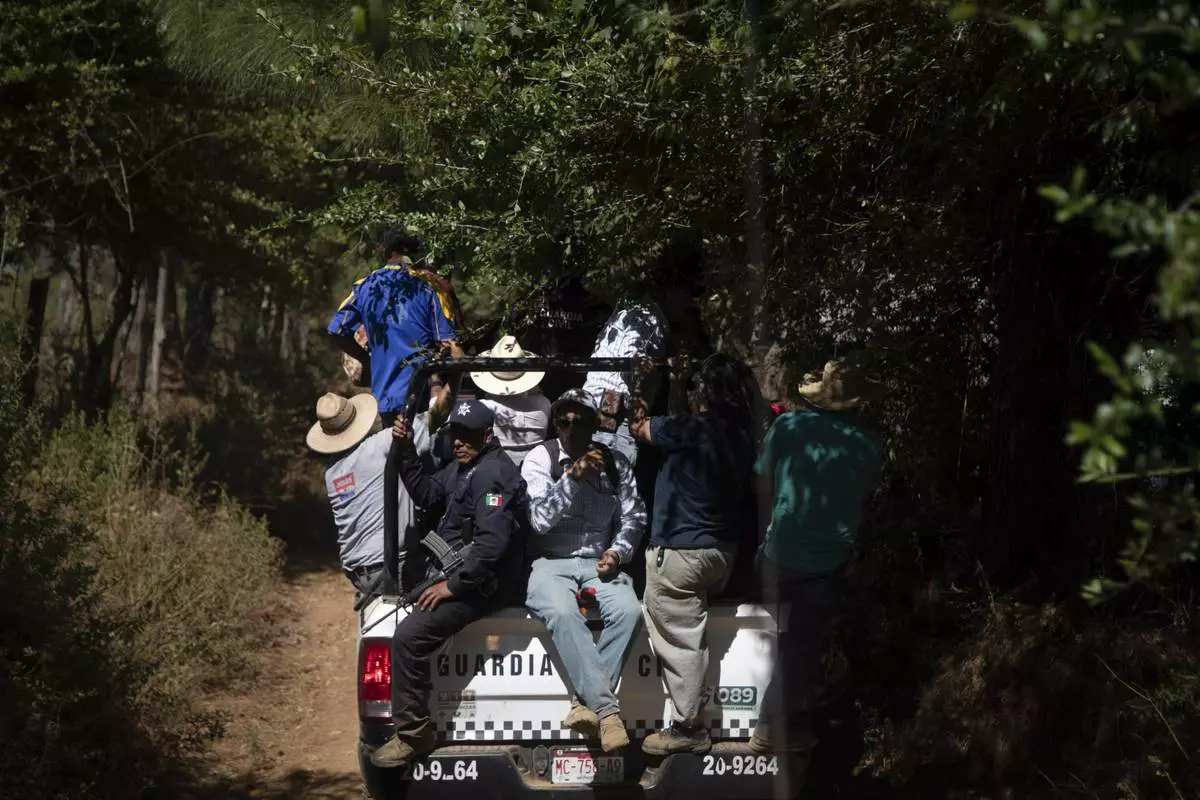
Locals ride in a National Guard truck in search of unlicensed water intakes and irrigation holding ponds that irrigate avocado and berry orchards during a drought in the mountains of Villa Madero, Mexico, Wednesday, April 17, 2024. Subsistence farmers and activists from the Michoacan town of Villa Madero organized teams to go into the mountains and rip out illegal water pumps and breach unlicensed irrigation holding ponds. (AP Photo/Armando Solis)
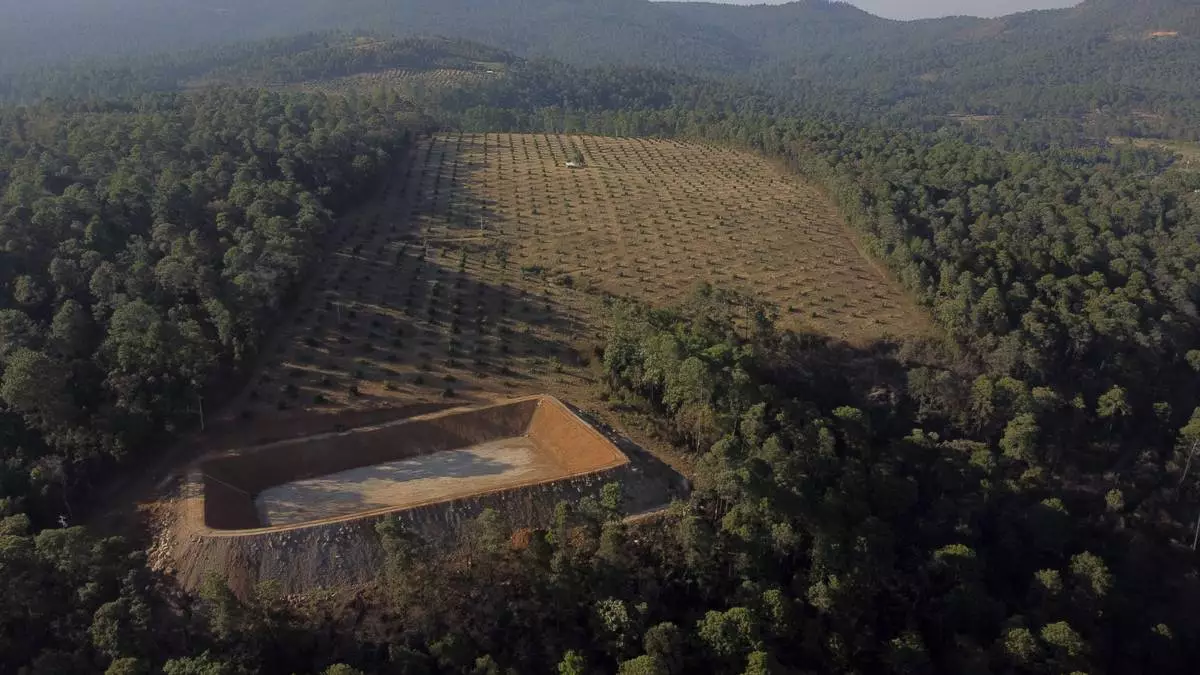
An unlicensed irrigation pond is under construction by an avocado orchard during a drought in the mountains of Villa Madero, Mexico, Wednesday, April 17, 2024. Farmers from Villa Madero who spotted the pond say they plan to meet with authorities to get the pond's owner to agree on a percentage of water usage, and if it fails, they plan to destroy it. (AP Photo/Armando Solis)
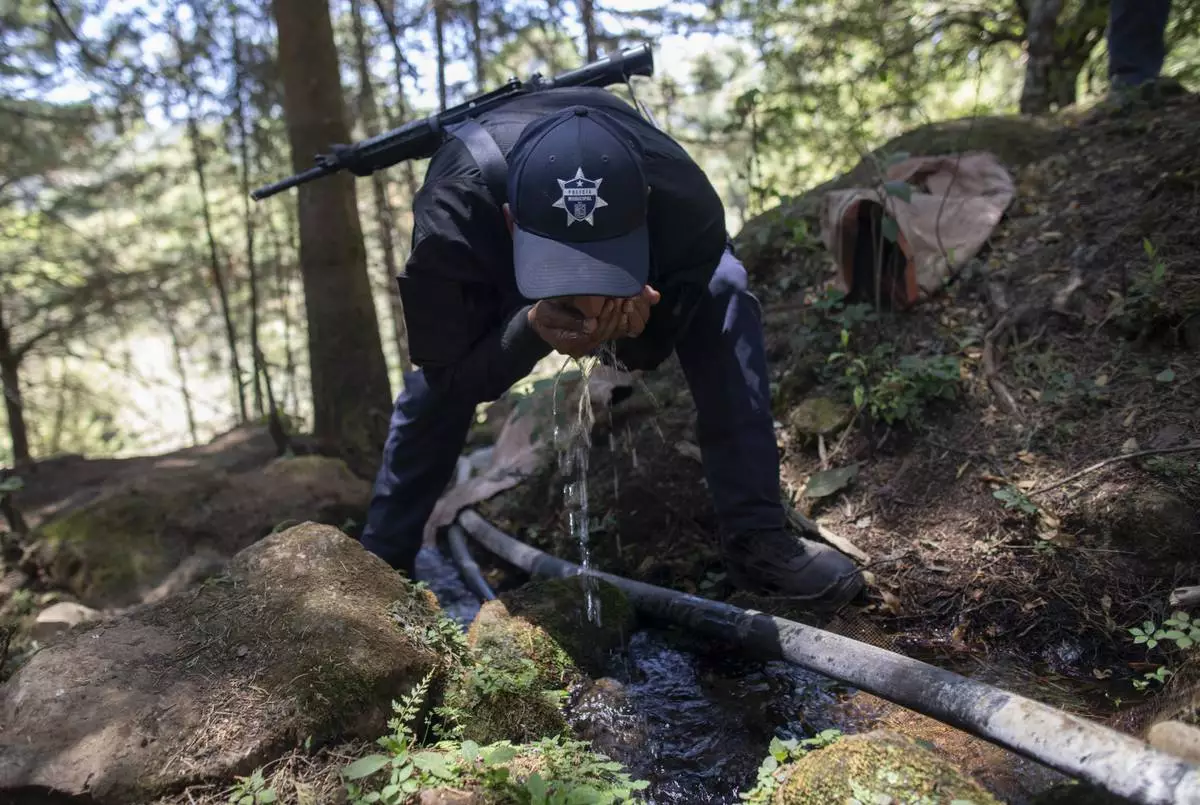
A municipal police officer drinks water from a stream lined with an unlicensed hose as he accompanies locals who are dismantling illegal water taps during a drought in the mountains of Villa Madero, Mexico, Wednesday, April 17, 2024. On Wednesday, dozens of residents, farmworkers and small-scale farmers from Villa Madero hiked up into the hills to tear out irrigation equipment using mountain springs to water avocado orchards carved out of the pine-covered hills. (AP Photo/Armando Solis)
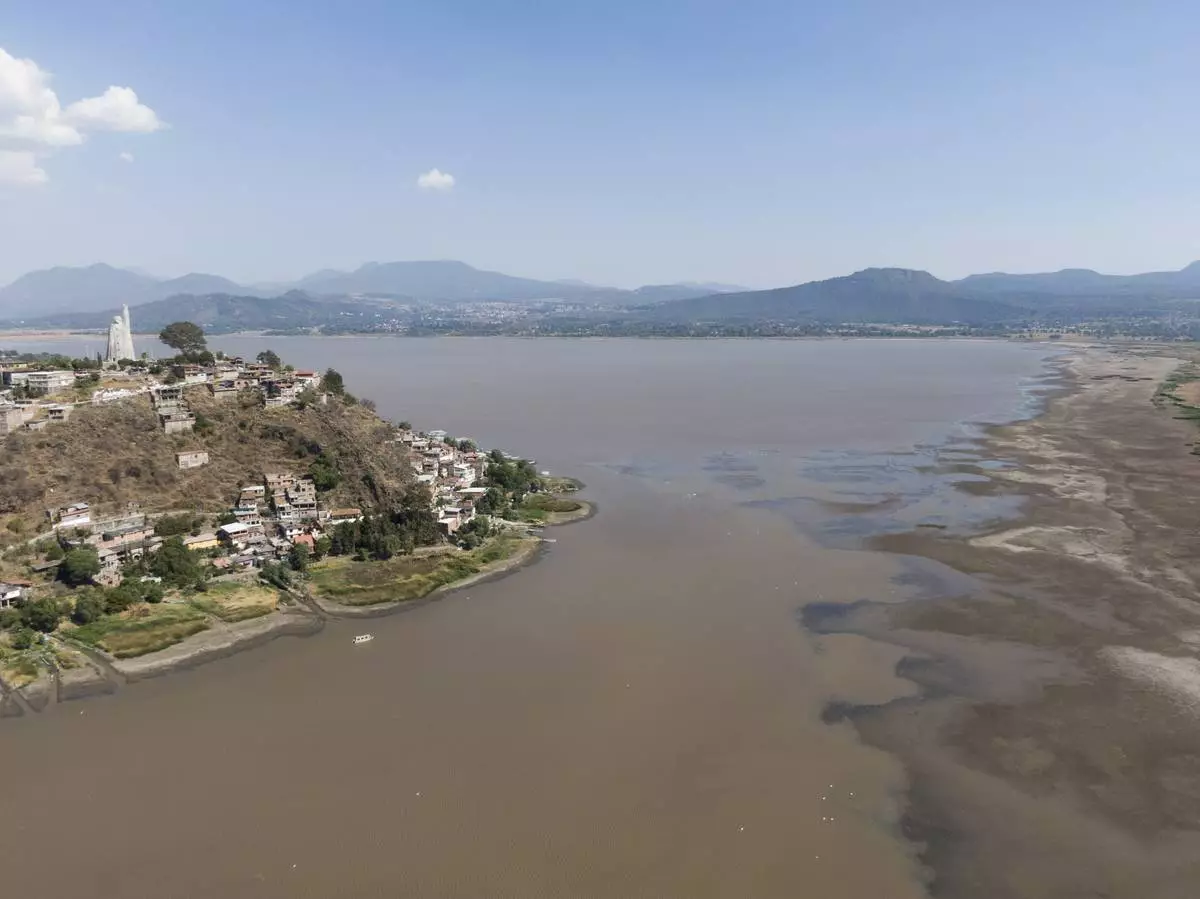
Janitzio Island stands in Lake Patzcuaro, which has low water levels during a drought in Mexico, Thursday, April 18, 2024. Farmers are starting to pasture livestock and plant crops on the lake bed. (AP Photo/Armando Solis)
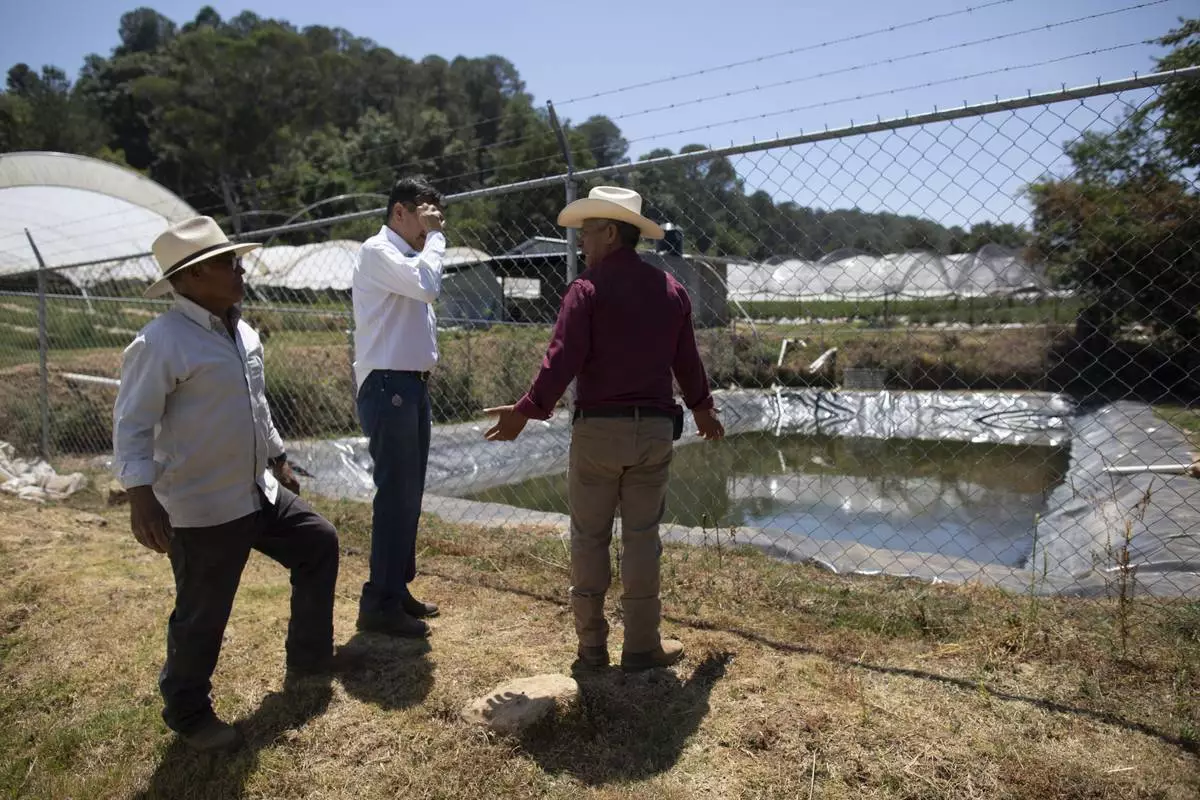
Residents of Villa Madero look at unlicensed irrigation holding ponds during a drought in the mountains of Villa Madero, Mexico, Wednesday, April 17, 2024. The group said they plan to meet with authorities to get the pond's owner to agree on a percentage of water usage, and if it fails, they plan to destroy it. (AP Photo/Armando Solis)
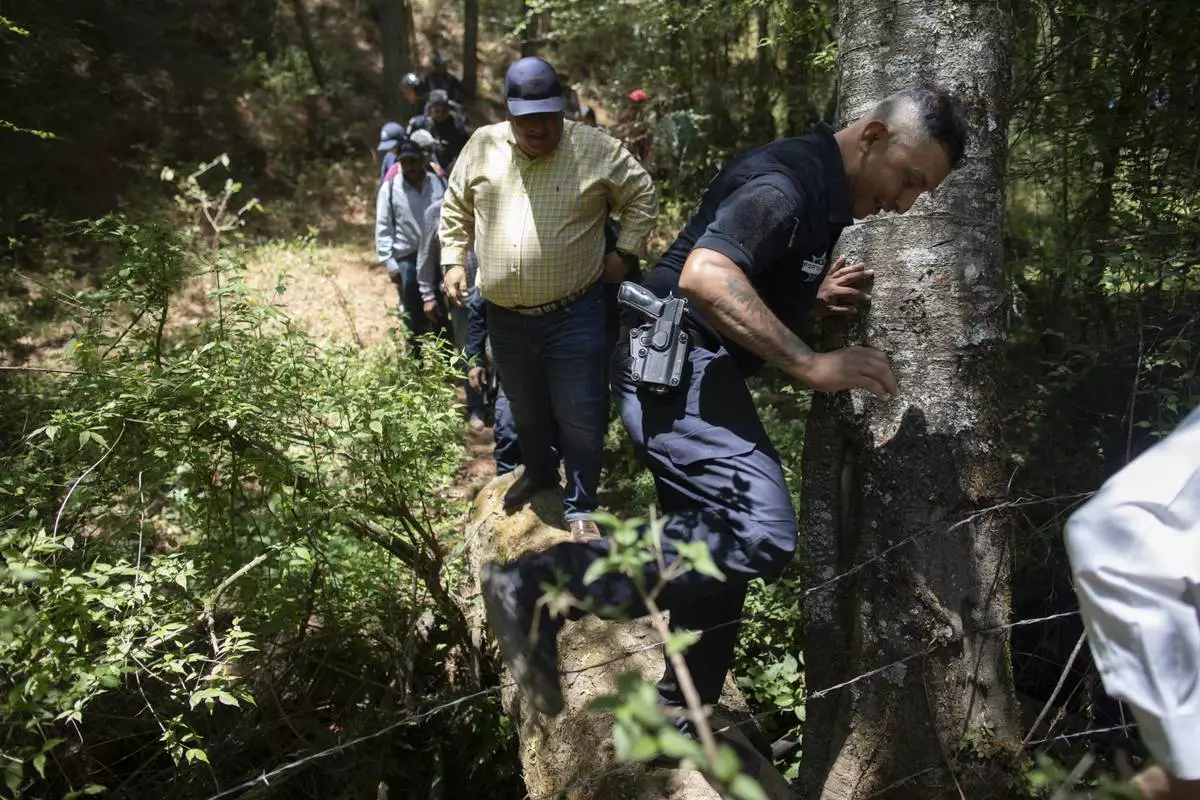
An armed police officer accompanies locals from Villa Madero through the mountains in search of unlicensed water intakes and irrigation ponds during a drought in Villa Madero, Mexico, Wednesday, April 17, 2024. Subsistence farmers and activists from the Michoacan town of Villa Madero organized teams to go into the mountains and rip out illegal water pumps and breach unlicensed irrigation holding ponds. (AP Photo/Armando Solis)
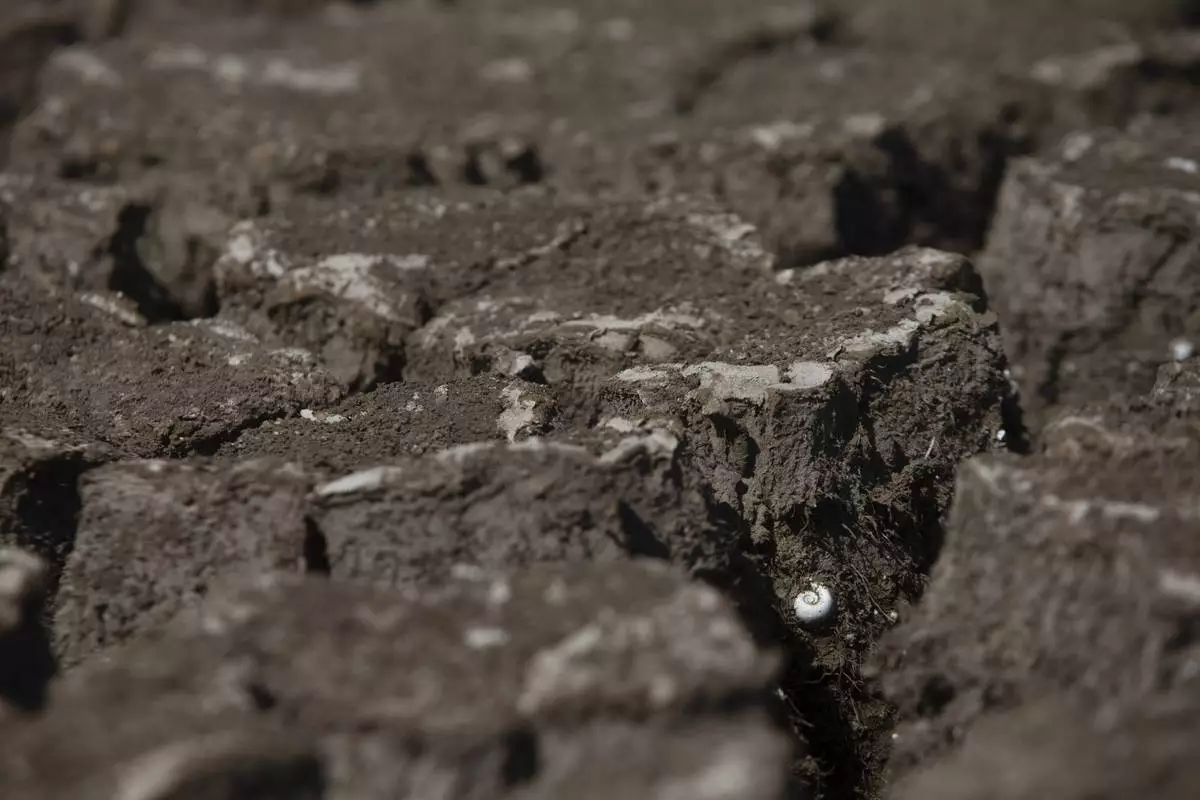
A snail lays in the dry bed of Lake Patzcuaro, during a drought in Mexico, Thursday, April 18, 2024. The lake has been reduced to about half its size, due to drought, deforestation, sediment buildup, and increased water demands from avocado and berry growers. (AP Photo/Armando Solis)

Boats are docked on the shore of Lake Patzcuaro, during a drought in Mexico, Thursday, April 18, 2024. Activist Juan Manuel Valenzuela estimates that 90% of the boats that used to fish and ferry tourists around are now out of service. (AP Photo/Armando Solis)
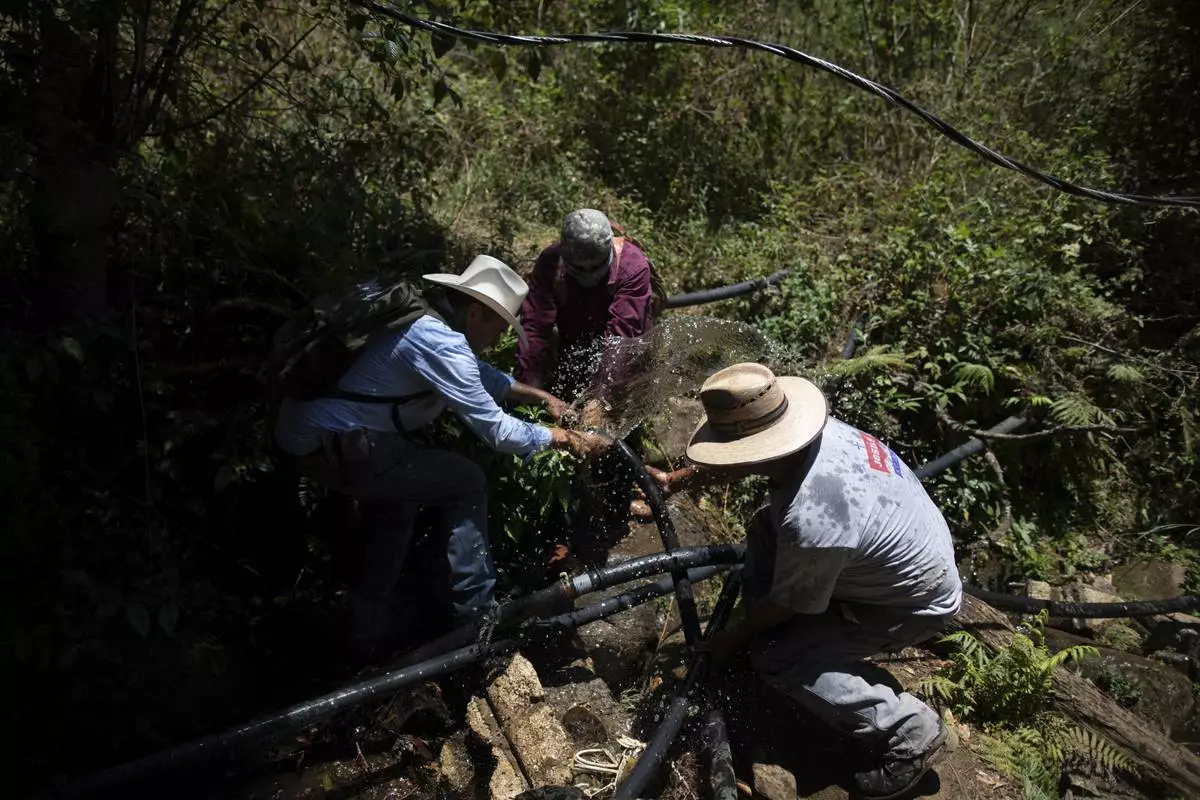
People dismantle an unlicensed water intake as their group of residents, farmworkers and small-scale farmers disconnect water taps in the mountains of Villa Madero, Mexico, Wednesday, April 17, 2024. As Mexico's drought drags on, angry farmers in Villa Madero have begun taking direct action to dismantle illegal water intakes which they say are drying up the streams in the mountains west of Mexico City. (AP Photo/Armando Solis)
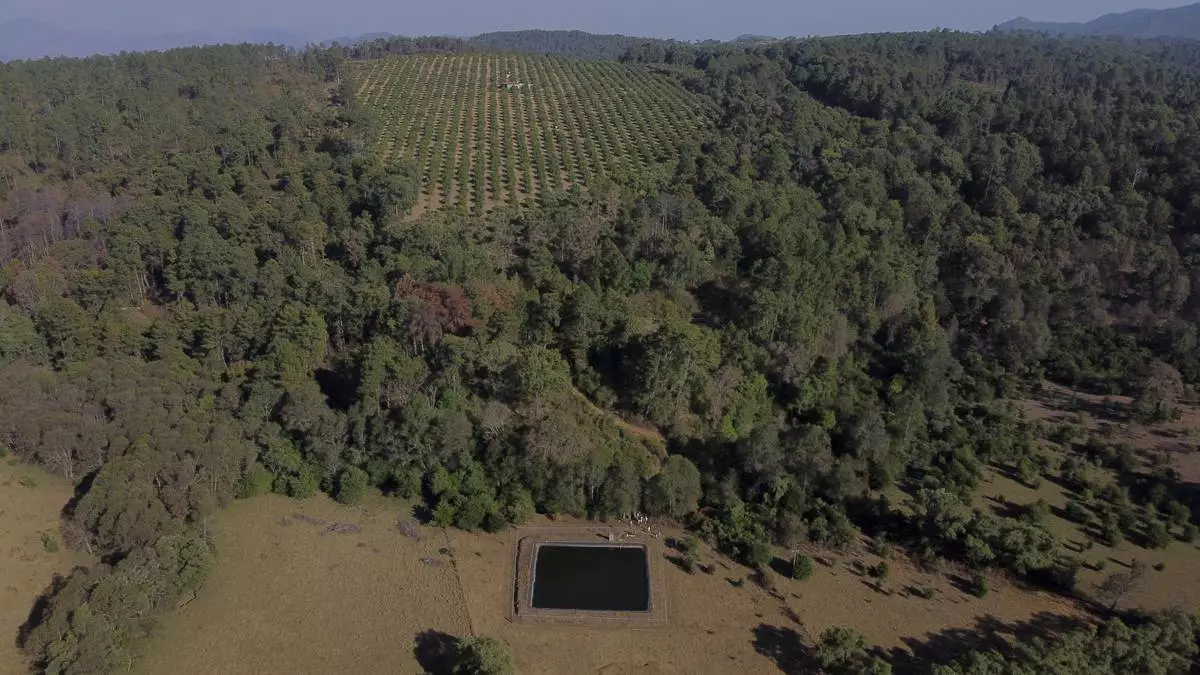
An unlicensed irrigation pond holds water near an avocado orchard in the mountains of Villa Madero during a drought in Mexico, Wednesday, April 17, 2024. Residents from Villa Madero who spotted the pond say they plan to meet with authorities to get the pond's owner to agree on a percentage of water usage, and if it fails, they plan to destroy it. (AP Photo/Armando Solis)
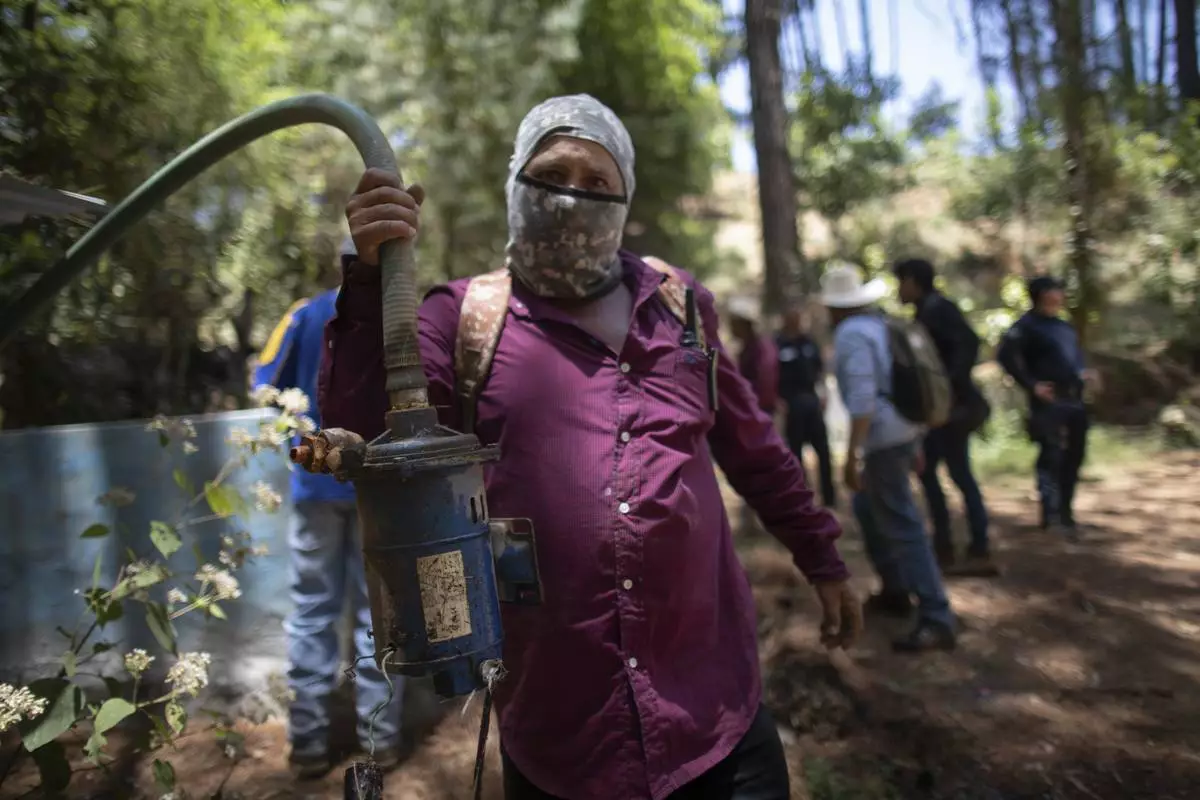
A man shows a pump removed from an unlicensed water intake as his group of residents, farmworkers and small-scale farmers from Villa Madero dismantle illegal water taps in the mountains of Villa Madero, Mexico, Wednesday, April 17, 2024. As a drought in Mexico drags on, angry subsistence farmers have begun taking direct action on thirsty avocado orchards and berry fields of commercial farms that are drying up streams in the mountains west of Mexico City. (AP Photo/Armando Solis)





















